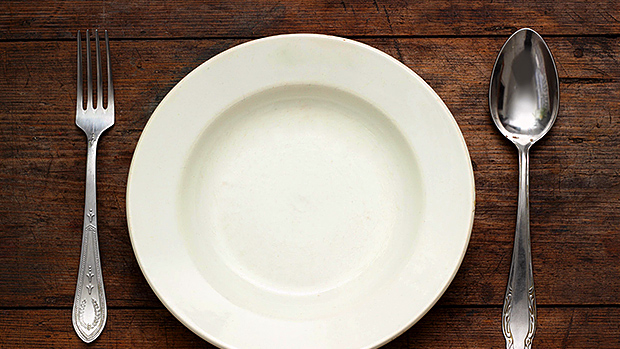I've received a ton of emails, private messages and verbal questions about the practical aspects of food purchasing, storage and preparation. Of these, I think concerned inquiries on the practical aspects of dietary fat rank highest in sheer numbers. And apparently, I am not the only one hearing this fretting over fat.
The other day, TC hit me up for an article that would finally address the multitude of T-Nation readers' questions on the practical use of fats and oils. I'm not surprised by all of this because for the last few decades, public education efforts regarding dietary fat have basically just told people to avoid, or at least minimize, the intake of fat.
Fat has become the new "F-word."
However, researchers are now coming out and saying that this is a misguided notion.(7, 11) And yet despite some positive turn around of late, it's the public that's been left reaping the sad consequences: ignorance of how to benefit from the good stuff.
So let me don my sumo suit, dig into the literature and once again become "the fat guy" as we play "Twenty Questions" (okay nine questions). Some of these have no blanket answer but many of you can nonetheless put certain facts into practice today!
Q: When I consume fish oil, should I have the same concerns as when I eat a lot of fish in general (i.e. is there a lot of mercury in fish oil capsules)? If so, should I look for fish oil capsules made from wild fish?
A: This is a good question and no doubt one that can be hotly debated. Here's a long quote from a scientific review article I just authored (11):
"Pollution affects fish (oil) quality. Polychlorinated biphenyls (PCBs) contaminate various species of fish and affect cognitive function in both children and adults.(McCook, 2001) The risk of heavy metal (e.g. mercury) contamination is real with regards to fish consumption, particularly larger predatory fish like swordfish, which consume smaller fish, accumulating toxins in their flesh.(Mendez, et al., 2001) The controversy over whether ingested mercury negates the benefits of accompanying fish fats for humans is not settled, however.(Guallar, E., et al., 2002; Yoshizawa, K., et al., 2002) In either case, dietary supplements may be a way to avoid the effects of such pollution. Over recent decades, a number of investigations screening fish oil products have resulted in negligible or absent mercury contamination.(Bugdahl, 1975; ConsumerLab, 2001; Foran, et al., 2003; Koller, et al., 1989) At least one review has revealed a lack of "key ingredient" in fish oil products, however.(ConsumerLab, 2001) A comprehensive screening of all available fish oil supplements for mercury contamination or even EPA and DHA content is not likely, however. Hence risks remain."
(See the upcoming [free] full JSSM publication for these and further references.)
I find it sad that if we choose farm-raised salmon we can end up consuming some (albeit not a large excess) of PCBs, yet if we choose wild cold water fish we risk consuming mercury. We have created a nasty, polluted world, my friends. My personal choice is to go with canned salmon because of its relatively low contamination risk and cheapness, along with smoked salmon on occasion because I love it, and finally with some inexpensive Sam's Club fish oil capsules--at least until we find an affordable quality alternative.
 |
Q: Is it okay to fry food?
A: From a fat quality standpoint, generally YES, so long as the oil isn't used more than a few times. (See more below.) Remember that frying has been a common method of fat intake for thousands of years in "healthy fat cultures." Look at the Mediterranean people! How long do they live to be... 180 or something?
Some oils like flax are more susceptible to oxidation (rancidity), however, and you should minimize their exposure to heat and even air. As an example, I grind whole flax seeds in a coffee grinder one baggie at a time (stored in the fridge), and add two tablespoons to my pot of oats just as they finish cooking. The truth is, though, that even baking flax into muffins or boiling flax pasta won't destroy the linoleate.(2, 12) My last-minute "oatmeal approach" just minimizes heat exposure and helps create a gel in the hot cereal, which I like.
Note: Some oils like flax and fish have very particular flavors and I think this limits how widely they can be used for frying anyway.
Q: If I fry, should I use coconut oil, peanut oil, or olive oil?
A: I prefer olive oil. Monounstaurated fats are common to olive and canola oils, and thus less exotic to some people, but nonetheless powerful nutraceuticals! And let's not forget the potent antioxidant phenols in the olive oil! If you like EVOO (extra virgin olive oil), great, but I usually don't nitpick that much and get the cheaper stuff. Admittedly, common monounsaturates tend to be stored more readily than shorter-chain fats in some studies but we need to fill the majority of our roughly 35% of daily kcal with something healthy other than fish and flax. Certainly, the tons of omega-6 fatty acids that most Americans swill don't fit this bill.
There's nothing wrong with peanut oil either (another source of monounsaturates, among other fatty acids), and I add it to my peanut chicken stir-fry, as part of the "natural" peanut butter. (While I'm on the natural PB thing, Consumer Reports wrote that the common type is very low in trans fats too; I just like the straight-forwardness and taste of peanuts in their own oil.)
For those concerned with aflatoxin contamination in peanuts, I wouldn't panic. Research I've seen is less than alarmist, suggesting that manual sorting and commercial heating procedures address the separation of contaminated versus sound kernels quite well.(6)
If you want to be concerned over peanuts, turn your attention to microwave heating, which damages them in unhealthy ways.(13) Holy conjugated trienes, Batman! Don't heat them this way!
Q: Is there some concern over how oils react to high heat? How long or hot can I fry oil before it becomes riddled with unhealthy trans fatty acids?
A: The short answer regarding trans fats is: don't worry about it! The long answer is more interesting, though. First, aside from some extreme circumstances, the cooking of vegetable oils simply doesn't create trans fatty acids because heat alone doesn't do this. A catalyst of some kind is needed and that doesn't happen in most home kitchens.(5, 17)
Even elaidic acid, which is the most-consumed trans fat in the American diet, isn't formed from healthy, monounsaturated oleic acid (cis type) by heat alone. As practical proof, consider that elaidic acid is solid at room temperature; so no matter how long or hot you keep your olive oil (mostly oleic acid) during cooking, it doesn't turn into a solid in the pan when the meal is done.
This is not to say that oils can be used and re-used indefinitely. Trans fat isomerization may not occur but several other aspects of quality do diminish. Smoke point and oil darkening are good practical indicators that the oil is losing quality such as antioxidant capacity, triglyceride breakdown, fatty acid oxidation (rancidity), etc.(1, 13, 16)
Again, long-chain highly unsaturated oils (fish, flax) are at greater risk. Perhaps oil re-use limits are more of a concern to restaurants with deep fryers, etc. I don't really use enough oil in cooking to save the pour-off for future use. Besides, the oil picks up the flavors of the last meal; I don't usually want that. If you do recycle oil at home, just recognize that there is some loss in quality each time and a limit perhaps of a half-dozen fryings is pushing it.(1, 16)
The mere existence of published limits constraining multiple fryings grosses me out a little. I mean, how many days or weeks would a cook re-use a batch of oil to save money? If you want to stay on your diet, think about this the next time you walk into a restaurant for a fried meal.
Q: What's the deal with palm and coconut oil anyhow? Are they as bad as people say?
A: I'm still up in the air over these unusual (read as: "plant") sources of saturated fat. I know there is published literature that FRESH palm oil (red palm) can be a healthy addition to the diet with its antioxidants and 50/50 ratio of saturated and unsaturated fatty acids.(4) Apparently it becomes a health problem (blood cholesterol, organ toxicity, etc.) only when oxidized and damaged.(4)
And coconut oil is intriguing due to various components (e.g. laurate is an anti-microbial medium chain fatty acid that is also metabolized quickly), but I nonetheless cannot ignore data suggesting coconut oil can be detrimental to blood lipid profile.(14, 18) I'm very open to new findings on this stuff, however. A quick browse around Medline suggests less fat gain under various protocols compared to other fats. (Apparently due to the metabolic effects of its MCT content.) Overall, based on the batting average of the food industry compared to Mother Nature, I'd wager that – once more data become available - coconut oil ends up being much better for at least some of us than hydrogenated (trans) fats are!
I may have mentioned this in another article or my Blog recently, but did you know that spanking new data suggest a direct association between trans fats and markers of systemic inflammation in women?(15) Remember that inflammation itself plays a role in obesity, heart disease, diabetes, etc., etc., etc. As if a whacked blood lipid profile and other problems weren't enough. For me, this is "strike three" regarding these long-debated hydrogenated fats!
Q: What's the deal with "cold pressed" oils?
A: The concept is basically that they are pressed from their source under low-heat (roughly a temperature no higher than a hot summer day) to minimize oxidative damage, and flavor loss. That's pretty, uh... cool. My understanding is that "cold pressed" is an unregulated label description and mostly archaic term, however. Vertical presses aren't commonly used nowadays and I believe olives, for one, are harvested in cold months anyway.
Once again, I think a shift toward healthier, affordable fat sources in general – and less nitpicking - should be the primary focus.
Q: Everybody recommends canola oil. Is it good stuff?
A: Yep. It has at least some linolenic acid (about 7%), which itself makes it better than many (omega-6 riddled) oils and it's a cheap source of monounsaturates. There are detractors of canola, but my opinion is that any such whining is just more nitpicking.
Q: What about all those new margarine-type spreads that supposedly don't have any trans fatty acids in them? Are they cool?
A: Yep, so long as total calorie intake is kept in check. I prefer Olivio and know other health professionals who have recommended it to patients with good results. It's a good fatty acid blend at a reasonable price. Remember that unlike zero-cal butter spray, though, globs of monounsaturates on toast and everything else are not going to help your fat loss goals! We need to keep a handle on energy balance. Olive oil-based margarines simply provide a generally healthy (but full-cal) type of flavor enhancer.
 |
Of course, some margarine companies take a different route and advertise either a special patented fatty acid blend or the inclusion of plant sterols / stanols to improve consumers' blood lipid profiles. There's some scientific evidence behind these as well. They're just pricey, that's all.
Remember that none of the margarines I'm discussing here are super-cheap "regular" margarines, which – unless they say otherwise on the label – contain varying amounts of hydrogenated trans fats, most commonly the bastardized, chemically straightened, trans form of oleic acid, called elaidic acid.(20) (Throw rotten tomatoes, boo and hiss now, if you have an old computer monitor.)
As far as the new, and even less common, hydrogenated fats that somehow avoid conversion into trans fats: wow, that's some nifty back-pedaling by the food industry. These new fangled hydrogenated fats are popping up everywhere. Food chemists, I tell you, brother, are a creative lot! First they create hydrogenation and trans fatty acids on purpose (for texture, shelf life, etc.) and now they're finding ways to work around the trans conversion. Personally, I rather just avoid anything that's hydrogenated, new-fangled or old, and go for whole foods. This way I can add my own oils to dishes in amounts and types I choose.
Q: Should I eat flax oil or fish oil? If you recommend variety, how exactly should I mix them up?
A: Fish oil fatty acids (EPA and DHA) are more potent biologically than the linolenic acid in flax and walnuts, for example.(19, 21) Still, linolenic acid appears to have effects of its own, without conversion to EPA and DHA.(3, 9, 10) For those interested in usual intake, alpha-linolenic acid from vegetable-oil products in the United States is approximately 1.2 grams daily and in Canada, approximately 2 grams daily.(8) Apparently the Canadians score more of this valuable omega-3 fatty acid due to greater canola intake.
Flax oil also can contain lignans which have anti-estrogenic properties.(Check out Something's Fishy Parts One and Two for more on this.) Although generally different from the isoflavones in soy, these lignans are phytoestrogens too, so it comes down to a personal choice regarding their use. Use of phytoestrogens for purely anti-estrogenic effects is still being studied. At least some recommendations suggest limiting flax intake to 2 Tbsp. per day because the hormonal and prostate effects remain unresolved. I've heard anecdotal reports, however, of lessened gynecomastia (bitch tits), but it no doubt depends on the dose and the endocrine state of the consumer (e.g. natural guy vs. aromatizing T user).
I personally take 3-6 fish oil capsules (the standard 30% concentration of EPA and DHA) most evenings as well as the aforementioned fresh-ground flax seeds in my oats most mornings. Let's not forget the very favorable overall fatty acid composition of flax (its fat is not just linoleate). But I don't want to over-do things regarding specific fats. In fact, I don't consume ground flaxseed year-round. I have great respect for fatty acids as nutraceuticals and remain wary of over-consuming any one food in general. I once had a bad experience with rancid flax oil (my abs were sore for days from all the hurling), which is one reason why I just opt for making my own fresh-ground "supplement." I use the coffee grinder trick I mentioned earlier to get the inherent linoleate, fiber and lignans, cheap.
During periods when you're looking for anti-estrogenic effects, added fiber and other fatty acids in addition to your usual fish oil intake, you may want to investigate your local bulk seller for cheap, whole flax seeds by the pound. The whole seeds are far more resistant to rancidity than straight oil or pre-ground "flours." I'm fortunate to have a small bulk seller near me called "Mr Bulky's." The flaxseeds I buy there save me money as well as future offerings to the porcelain gods. Of course, you can always just get your linoleate via walnuts if the whole flax issue sounds to risky.
References:
1. Andrikopoulos, N., et al. Deterioration of natural antioxidant species of vegetable edible oils during the domestic deep-frying and pan-frying of potatoes. Int J Food Sci Nutr. 2002 Jul;53(4):351-63.
2. Cunnane S., et al. Nutritional attributes of traditional flaxseed in healthy young adults. Am J Clin Nutr. 1995 Jan;61(1):62-8.
3. De Caterina, R., et al. S. n-3 fatty acids and cardiovascular diseases: update to 1996. G Ital Cardiol. 1996 May;26(5):563-78.
4. Edem, D. Palm oil: biochemical, physiological, nutritional, hematological, and toxicological aspects: a review. Plant Foods Hum Nutr. 2002 Fall;57(3-4):319-41.
5. Enig, M. Trans fatty acids are not formed by heating vegetable oils. In: Wise Traditions in Food, Farming and the Healing Arts: winter 2003. Weston A. Price Foundation. www.westonaprice.org; accessed June, 2004.
6. Galvez, F., et al. Manual sorting to eliminate aflatoxin from peanuts. J Food Prot. 2003 Oct;66(10):1879-84.
7. Gifford, K. Dietary fats, eating guides, and public policy: history, critique, and recommendations. Am J Med. 2002 Dec 30;113 Suppl 9B:89S-106S.
8. Hunter, J. n-3 fatty acids from vegetable oils. Am J Clin Nutr. 1990 May;51(5):809-14.
9. Lanzmann-Petithory, D. Alpha-linolenic acid and cardiovascular diseases. J Nutr Health Aging. 2001;5(3):179-83.
10. Lee, J., et al. Antimicrobial synergistic effect of linolenic acid and monoglyceride against Bacillus cereus and Staphylococcus aureus. J Agric Food Chem. 2002 Mar 27;50(7):2193-9.
11. Lowery, L. Dietary Fat and Sports Nutrition: A Primer. J Sports Sci Med. In press. www.jssm.org; accessed June, 2004.
12. Manthey, F., et al. Processing and cooking effects on lipid content and stability of alpha-linolenic acid in spaghetti containing ground flaxseed. J Agric Food Chem. 2002 Mar 13;50(6):1668-71.
13. Megahed, M. Microwave roasting of peanuts: Effects on oil characteristics and composition. Nahrung. 2001 Aug;45(4):255-7.
14. Mendis, S., et al. Coconut fat and serum lipoproteins: effects of partial replacement with unsaturated fats. Br J Nutr. 2001 May;85(5):583-9.
15. Mozaffarian, D. Dietary intake of trans fatty acids and systemic inflammation in women. Am J Clin Nutr. 2004 Apr;79(4):606-12.
16. Onal, B. and Ergin, G. Antioxidative effects of alpha-tocopherol and ascorbyl palmitate on thermal oxidation of canola oil. Nahrung. 2002 Dec;46(6):420-6.
17. Orchin, M. Teaching : A Lifetime of Learning. http://www.quantum-chemistry-history.com; accessed June, 2004.
18. Pehowich, D., et al. Fatty acid composition and possible health effects of coconut constituents. West Indian Med J. 2000 Jun;49(2):128-33.
19. Sanderson, P., et al. UK Food Standards Agency alpha-linolenic acid workshop report. Br J Nutr. 2002 Nov;88(5):573-9.
20. Steinhart, H., et al. Trans fatty acids (TFA): analysis, occurrence, intake and clinical relevance. Eur J Med Res. 2003 Aug 20;8(8):358-62.
21. Su, H., et al. Bioequivalence of dietary alpha-linolenic and docosahexaenoic acids as sources of docosahexaenoate accretion in brain and associated organs of neonatal baboons. Pediatr Res. 1999; 45(1):87-93.




